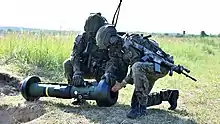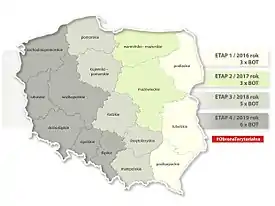Territorial Defence Force (Poland)
The Territorial Defence Force – TDF (Polish: Wojska Obrony Terytorialnej – WOT) is the fifth military branch of the Polish Armed Forces, following Land Forces, Air Force, Navy and Special Forces.[4] The force is made up of professional and part-time volunteer soldiers, forming part of the country's defence and deterrence system. Formed in 2016, it had reached 24,000 personnel by July 2019,[5][6] and was slated to reach a size of around 53,000 personnel in 17 light infantry brigades by 2021.[7] The creation of the Polish TDF relates to the reforms in the Baltic states' Territorial Defence Forces to provide response during the early stages of a hybrid conflict.[8]
| Polish Territorial Defence Forces | |
|---|---|
| Wojska Obrony Terytorialnej | |
 | |
| Founded | January 1, 2017 |
| Country | |
| Allegiance | Polish Armed Forces |
| Type | light infantry |
| Size | 40,000+ (2023)[1] |
| Motto(s) | Always ready, always close |
| Commanders | |
| Commander of Territorial Defence Forces | gen. bryg Maciej Klisz[2] |
| Insignia | |
| Flag[3] |  |
History


The Territorial Defence Force is a planned reserve component of Poland's military.[9] A similar, identically named organization had existed in the country since 1965, but was disbanded in 2008 as part of a modernization program. The re-creation of the Territorial Defence Force was first announced in 2015 in reaction to the war in Donbass and concern that Poland's existing military would be ill-equipped to confront an adversary under similar conditions of low-intensity conflict. According to government officials, public reception to the idea was positive with 11,000 persons registering interest in joining the force within the first few months after the initial announcement.[10] The program was subsequently formalized with the signing of "a new document concerning the functioning of the territorial defense concept" by Minister of Defence of Poland Antoni Macierewicz in a ceremony held at Warsaw's Waldemar Milewicz General Secondary School on April 27, 2016.[11]
On May 21, 2017 in Bialystok, Lublin and Rzeszow took place the first military oath in the history of WOT.
On the basis of Decision No. 140 / MON of the Minister of National Defense of 28 June 2017, TDF was declared the successor to the traditions of the Home Army National Command (1942–1945) of the Second World War, while being the de facto successor to the heritage of its forebears.
Organization

Plans announced in January 2016 called for what officials said would eventually become a 46,000-man contingent, though initially the WOT would consist of just three brigades sited in the north east of the country and funded with an annual appropriation of approximately €60 million; it was later reported the force would have a maximum size of 35,000 personnel.[12][13] As envisaged, the Territorial Defence Force is to be a part-time, all-volunteer organization, with soldiers receiving 30 days of military training per year. Unlike existing reserve forces, which upon mobilization are integrated into regular components of the Polish military, the Territorial Defence Force will be designed to operate autonomously in home areas and with personnel drawn from the local population. According to Polish military planners, this set-up would be most effective in countering hybrid warfare.[12] As part of the Ministry of Defense acquisition plans for 2017–2022, the total number of volunteers was set to 50,000 and a budget of 3.2 billion zloty outlaid to arm and equip them.[14]
Besides responding to external military threats, the WOT will, according to the Defense Ministry, help strengthen Poland's "patriotic and Christian foundations".[15]
Poland is divided into 16 Voivodeships. The Territorial Defence Troops follow the administrative division with a brigade formed in each voievodship. The exception is the Masovian, which has two territorial defence brigades due to the significance of the capital Warsaw. For mobilisation duties and liaison to the local authorities there is a Voievodship Military Staff in each of the 16 voievodships and the territorial brigades' HQs are located nearby. The commander of the Territorial Defence Troops is a division general and the brigades are commanded by colonels.

- HQ in Warsaw
- 1st Podlaska Territorial Defence Brigade "Col. Władysław Liniarski „Mścisław”" in Białystok
- 11th Light Infantry Battalion in Białystok
- 12th Light Infantry Battalion in Suwałki
- 13th Light Infantry Battalion in Łomża
- 14th Light Infantry Battalion in Bielsk Podlaski
- 2nd Lublin Territorial Defence Brigade "Maj. Hieronim Dekutowski „Zapora”" in Lublin
- 21st Light Infantry Battalion in Lublin
- 22nd Light Infantry Battalion in Dęblin
- 23rd Light Infantry Battalion in Biała Podlaska
- 24th Light Infantry Battalion in Chełm
- 25th Light Infantry Battalion in Zamość
- 3rd Podkarpacka Territorial Defence Brigade "Col. Łukasz Ciepliński" in Rzeszów
- 4th Warmian-Masurian Territorial Defence Brigade "Capt. Gracjan Klaudiusz Fróg „Szczerbiec”" in Olsztyn
- 5th Masovian Territorial Defence Brigade "1Lt. Mieczysław Dziemieszkiewicz „Rój”" in Ciechanów (covering Northern Masovia)
- 51st Light Infantry Battalion in Ciechanów
- 52nd Light Infantry Battalion in Komorowo
- 53rd Light Infantry Battalion in Siedlce
- 54th Light Infantry Battalion in Zegrze Południowe
- 6th Masovian Territorial Defence Brigade "Rotmistrz Witold Pilecki" in Radom
- 61st Light Infantry Battalion in Grójec
- 62nd Light Infantry Battalion in Radom
- Light Infantry Battalion in Płock
- Light Infantry Battalion in Książenice
- Light Infantry Battalion in Pomiechówek
- 7th Pomeranian Territorial Defence Brigade in Gdańsk
- 71st Light Infantry Battalion in Malbork
- 72nd Light Infantry Battalion in Kościerzyna
- 73rd Light Infantry Battalion in Słupsk
- 8th Kuyavian-Pomeranian Territorial Defence Brigade "Brig. Gen. Elżbieta Zawacka „Zo”" in Bydgoszcz
- 81st Light Infantry Battalion in Toruń
- 82nd Light Infantry Battalion in Inowrocław
- 83rd Light Infantry Battalion in Grudziądz
- 9th Łódź Territorial Defence Brigade in Łódź
- 91st Light Infantry Battalion in Zgierz
- 92nd Light Infantry Battalion in Kutno
- 93rd Light Infantry Battalion in Łask
- 94th Light Infantry Battalion in Piotrków Trybunalski
- 10th Świętokrzyska Territorial Defence Brigade "Maj. Eugeniusz Gedymin Kaszyński „Nurt”" in Kielce
- 101st Light Infantry Battalion in Kielce
- 102nd Light Infantry Battalion in Sandomierz
- 103rd Light Infantry Battalion in Ostrowiec Świętokrzyski
- 11th Lesser Poland Territorial Defence Brigade in Kraków
- 12th Greater Poland Territorial Defence Brigade in Poznań
- 13th Silesian Territorial Defence Brigade in Katowice
- 131st Light Infantry Battalion in Gliwice
- 132nd Light Infantry Battalion in Częstochowa
- 133rd Light Infantry Battalion in Cieszyn
- 134th Light Infantry Battalion in Kuźnia Raciborska
- 171st Light Infantry Battalion in Brzeg
- 14th West Pomeranian Territorial Defence Brigade in Szczecin
- 141st Light Infantry Battalion in Choszczno
- 142nd Light Infantry Battalion in Trzebiatów
- 16th Lower Silesian Territorial Defence Brigade in Wrocław
- 161st Light Infantry Battalion in Wrocław/Kłodzko
- 162nd Light Infantry Battalion in Głogów
- 1st Podlaska Territorial Defence Brigade "Col. Władysław Liniarski „Mścisław”" in Białystok
Each brigade also has a command, a support, a sapper and a logistic company, carrying the brigade's number.
Tasks of the Territorial Defense Forces
The Territorial Defense Forces are dedicated to:[16][17]
- Conducting defense activities in cooperation with the Operational Forces and supporting elements of the non-military system.
- Carrying out unconventional activities, anti-sabotage and offensive landing.
- Participate in safeguarding the reception and development of allied reinforcement forces in commanded areas.
- Implementation of projects in the area of: crisis management, the eradication of natural disasters and the elimination of their effects, property protection, search and rescue operations.
See also
References
- "Nowe bataliony. WOT liczy już ponad 24 tys. (New TDF battalions. Number of military personnel more than 24 000)".
- "Gen. Kukuła już nie dowodzi WOT. Znamy następcę".
- "Ustawa z dnia 19 lutego 1993 r. o znakach Sił Zbrojnych Rzeczypospolitej Polskiej" [Act of February 19, 1993 on the symbols of the Armed Forces of the Republic of Poland] (PDF). isap.sejm.gov.pl (in Polish). Internet System of Legal Acts. pp. 24–28. Retrieved 10 October 2021.
- Ministry of National Defence of the Republic of Poland (10 May 2017). "Territorial Defence Forces". Official website of the Ministry of National Defence of the Republic of Poland. Retrieved 6 July 2017.
- "Nowe bataliony WOT (New TDF battalions) - MilMag.pl".
- "Trzeci rok szkolenia 3. Podkarpackiej Brygady WOT - Defence24".
- "Rośnie stan osobowy Wojsk Obrony Terytorialnej - Defence24".
- Piotr, Szymański (20 March 2015). "The Baltic states' Territorial Defence Forces in the face of hybrid threats". The Centre for Eastern Studies (OSW). Retrieved 6 July 2017.
- "Poland to stand up Territorial Defence Force". Jane's. 22 March 2016. Retrieved 3 June 2016.
- "Polish MoD Discusses The National Reserve Forces Reform And The Territorial Defence Units. 11 Thousand Recruits Registered For Training". Defence24. 15 July 2015. Retrieved 3 June 2016.
- "The Signing of the Territorial Defense Concept". mon.gov.pl. Ministry of National Defence of Poland. Retrieved 3 June 2016.
- "Poland plans paramilitary force of 35,000 to counter Russia". BBC News. 3 June 2016. Retrieved 3 June 2016.
- Day, Matthew (25 January 2016). "Poland to establish 46,000-strong national guard in the face of war in eastern Ukraine". The Daily Telegraph. Retrieved 3 June 2016.
- "Poland To Spend $14.5 Billion For Military Procurement From 2017-2022". DefenseWorld.net. 7 December 2016. Retrieved 16 April 2019.
- "MON w Sejmie: Wiara chrześcijańska polskich żołnierzy gwarantem bezpieczeństwa Polski". Newsweek Polska. 10 March 2016. Retrieved 3 June 2016.
- "Ministerstwo Obrony Narodowej".
- Burkle, Frederick M.; Goniewicz, Mariusz; Goniewicz, Krzysztof (January 2019). "The Territorial Defence Force in Disaster Response in Poland: Civil-Military Collaboration during a State of Emergency". Sustainability. 11 (2): 487. doi:10.3390/su11020487.